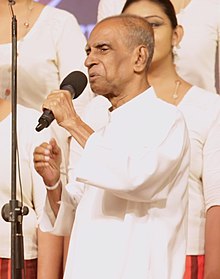This article may contain unverified or indiscriminate information in embedded lists. (December 2017) |
W. D. Amaradeva | |
|---|---|
 Pandit Amaradeva in 2014 | |
| Born | Wannakuwatta Waduge Don Albert Perera 5 December 1927 |
| Died | 3 November 2016 (aged 88) |
| Nationality | Sri Lankan |
| Education | Bhatkhande Music Institute |
| Alma mater | Bhatkhande Music Institute Siddharta Vidyalaya Kalutara Vidyalaya Moratu Maha Vidyalaya Sri Sumangala College[1] |
| Occupation(s) | Musician, singer, composer , Chancellor of the University of the Visual and Performing Arts |
| Years active | 1947–2016 |
| Spouse | Wimala Amaradewa |
| Children | Ranjana, Subhani, and Priyanvada |
| Awards | Philippine Ramon Magsaysay Award (2001), Indian Padma Sri Award (2002), President's Award of Kala Keerthi (1986), Doctor of Philosophy (Fine Arts) Honoris Causa (University of Kelaniya - 1991), The Degree of Doctor of Letters (University of Ruhuna - 1993),[2] Honorary degree of Doctor of Letters (University of Peradeniya)[3] (1998), Deshamanya (1998), Sri Lankabhimanya (2017) |
| Website | amaradevafoundation |
Sri Lankabhimanya Wannakuwattawaduge Don Albert Perera[4] (Sinhala: වන්නකුවත්තවඩුගේ දොන් ඇල්බට් පෙරේරා; Tamil: டபிள்யூ. டி. அமரதேவா; 5 December 1927 – 3 November 2016), better known by his adopted name Amaradeva, was a prominent Sri Lankan Sinhalese vocalist, violinist and composer. Primarily using traditional instruments like sitars, tablas and harmoniums, he incorporated Sinhala folk music with Indian ragas in his work.[5] Many consider his contribution to the development of Sinhala music as unmatched; hence, he is occasionally cited as the "Maestro of Sri Lankan Music" (Sinhala: හෙළයේ මහා ගාන්ධර්වයා, romanized: Helayay Maha Gandarvaya).[3][6][7]
In the mid-1950s, Amaradeva in his Janagayana project consulted experts of the Kandyan dance tradition like Panibharatha, Kiriganita, Gunamala, Ukkuva and Suramba in his path to understand what constituted Sinhala folk music. Noting that it mostly revolved around a single melody, he decided to add verses that would lead up to the central melody which would now be a chorus thus forming two parts (unseen earlier in traditional Sri Lankan music) removing restrictions that had existed earlier. In doing so, he created a uniquely Sinhalese music style that stayed true to folk tradition while incorporating outside influences. His work was vital in the creation of the "sarala gee" genre practised subsequently by artists like Sanath Nandasiri, Victor Ratnayake, T.M. Jayaratne, Sunil Edirisinghe and Gunadasa Kapuge etc.[8][9]
Amaradeva received numerous awards, including the Philippine Ramon Magsaysay Award (2001), Indian Padma Sri Award (2002)[10] and Sri Lankan "President's Award of Kala Keerthi" (1986) and Deshamanya Award (1998). In 2003 the French government awarded him the prestigious honour; Ordre des Arts et des Lettres.[11] Notably he still remains the most popular artist as confirmed by Nielsen Media Research findings.[12] He has also represented Sri Lanka in many forums including the UNESCO 1967 Manila Symposium. The University of Kelaniya conferred on him the Degree of Doctor of Philosophy (Fine Arts) Honoris Causa in 1991 and the University of Ruhuna and University of Peradeniya conferred on him the Degree of Doctor of Letters, Honoris Causa in 1993 and 1998.[2][3]
In 1972, Amaradeva composed the music for the Maldivian National Anthem (Gaumii salaam) at the request of Maldivian Government.
Amaradeva died at the age of 88 on 3 November 2016 due to heart failure. A state funeral was held by the government, followed by a week of national mourning.
- ^ Pandit Amaradeva strikes a note from the past The Sunday Times- 16 August 2016
- ^ a b "SOUL OF THE NATION" (PDF). The nation. Retrieved 4 November 2016.
- ^ a b c GENERAL CONVOCATION 1998, University of Peradeniya - 9 November 2016
- ^ "National Honours – 2017". The Daily Mirror (Sri Lanka). The Daily Mirror (Sri Lanka). 21 March 2017. Retrieved 21 March 2017.
- ^ "වසන්තයේ මල් පොකුරු නෙළා..." Sarasaviya. Retrieved 11 March 2017.
- ^ Amaradeva felicitated Daily News – 8 July 2011
- ^ More recognition for the musical genius Daily FT – 6 September 2014
- ^ Tribute to Amaradeva over BBC Sandeshaya Daily News – 12 December 2007
- ^ "Maestro Amaradeva is Sri Lanka's most celebrated singer, musician and violinist". 2 March 2008. Retrieved 12 August 2017.
- ^ "Padma Awards" (PDF). Ministry of Home Affairs, Government of India. 2015. Archived from the original (PDF) on 15 October 2015. Retrieved 21 July 2015.
- ^ Amaradeva bags two more awards Sunday Times – 10 November 2016
- ^ Amaradeva the lure of a Maestro Sunday Times – 26 June 2011